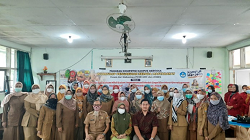Konsep dan Sistem Nilai dalam Implementasi Model Cognitive Moral Development bagi Pendidik pada Pembelajaran Abad-21 Concepts and Value Systems in the Implementation of Cognitive Moral Development Models for Educators in 21st Century Learning
Main Article Content
Abstract
Quality improvement in instilling moral values and character in the world of education is an obligation today. The paradigm of character education by prioritizing violence still often occurs in educational practice in Indonesia, so appropriate solutions are needed to instill character values in elementary schools. This service was carried out at SDN 4 Kenanga by inviting participants of 50 elementary school teachers in the Sumber and Plumbon Districts. The implementation of the research consists of the preparation stage, implementation stage, monitoring, and evaluation stage. The service results show an increase in understanding of concepts and practices in the cognitive moral development model through the digital animation story method after the workshop. This activity concludes that this service has achieved the target of transmitting knowledge of the concept of value systems and character education models needed by elementary school teachers in 21st-century learning, which is expected to be a solution in moral and character education. The teacher has also implemented an action strategy model of cognitive moral development by the criteria for elementary school students.
Downloads
Article Details
Authors who publish with this journal agree to the following terms:
- Any article on the copyright is retained by the author(s).
- Author grant the journal, right of first publication with the work simultaneously licensed under a Creative Commons Attribution License that allows others to share work with acknowledgment of the work authors and initial publications in this journal.
- Authors are able to enter into a separate, additional contractual arrangements for non-exclusive distribution of published articles of work (eg, post-institutional repository) or publish it in a book, with acknowledgment of its initial publication in this journal.
- Authors are permitted and encouraged to post their work online (e.g., in institutional repositories or on their websites) prior to and during the submission process, as can lead to productive exchanges, as well as earlier and greater citation of published work.
- The article and any associated published material is distributed under the Creative Commons Attribution-ShareAlike 4.0 International License
References
Baginda, M. 2016. Nilai-Nilai Pendidikan Berbasis Karakter pada Pendidikan Dasar dan Menengah. Jurnal Ilmiah Iqra'. 10(2):1-12. http://dx.doi.org/10.30984/jii.v10i2.593
Christiana, E. 2019. Identifikasi Bentuk kekerasan dan Penangannya di Lingkungan Sekolah Dasar. Child Education Journal. 1(2):58–64. https://doi.org/10.33086/cej.v1i2.1368
Faiz, A., Soleh, B., Kurniawaty, I., Purwati. 2021. Tinjauan Analisis Kritis Terhadap Faktor Penghambat Pendidikan Karakter di Indonesia. Jurnal Basicedu. 5(4):1766–1777. https://doi.org/https://doi.org/10.31004/basicedu.v5i4.1014
Fauzi, I. 2017. Dinamika Kekerasan Antara Guru dan Siswa: Studi Fenomenologi Tentang Resistensi antara Perlindungan Guru dan Perlindungan Anak. Tarbiyatuna: Jurnal Pendidikan Islam. 10(2):158-187.
Ilham, M. 2013. Kekerasan Guru Terhadap Siswa (Studi Fenomenologi Tentang Bentuk Kekerasan Guru Dan Legitimasi Penggunaannya). Paradigma. 1(3):1-4.
Lickona, T. 2012. Character Matters. Wahyudun, U., Budimansyah, eds. Semarang: Bumi Aksara.
Muis, T. 2017. Tindakan Kekerasan Guru Terhadap Siswa dalam Interaksi Belajar Mengajar (Studi Kasus di SMAN Surabaya). Jurnal Pendidikan (Teori Dan Praktik). 2(1):86-90. https://doi.org/10.26740/jp.v2n1.p86-90
Saputri, N.L. 2021. Demi Main Game Online, Sejumlah Anak di Bawah Umur Nekat Curi Buku Paket Sekolah, Dijual Rp 600 Ribu. https://www.tribunnews.com/regional/2021/02/18/demi-main-game-online-sejumlah-anak-di-bawah-umur-nekat-curi-buku-paket-sekolah-dijual-rp-600-ribu
Setyawan, D. 2017. Indonesia Peringkat Tertinggi Kasus Kekerasan di Sekolah. https://www.kpai.go.id/publikasi/indonesia-peringkat-tertinggi-kasus-kekerasan-di-sekolah
Widadio, N.A. 2019. KPAI catat 153 kasus kekerasan fisik dan psikis di sekolah pada 2019. https://www.aa.com.tr/id/nasional/kpai-catat-153-kasus-kekerasan-fisik-dan-psikis-di-sekolah-pada-2019/1688253
